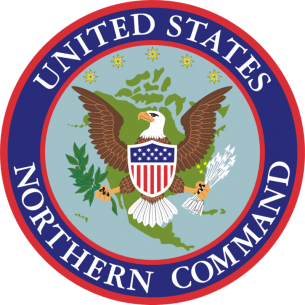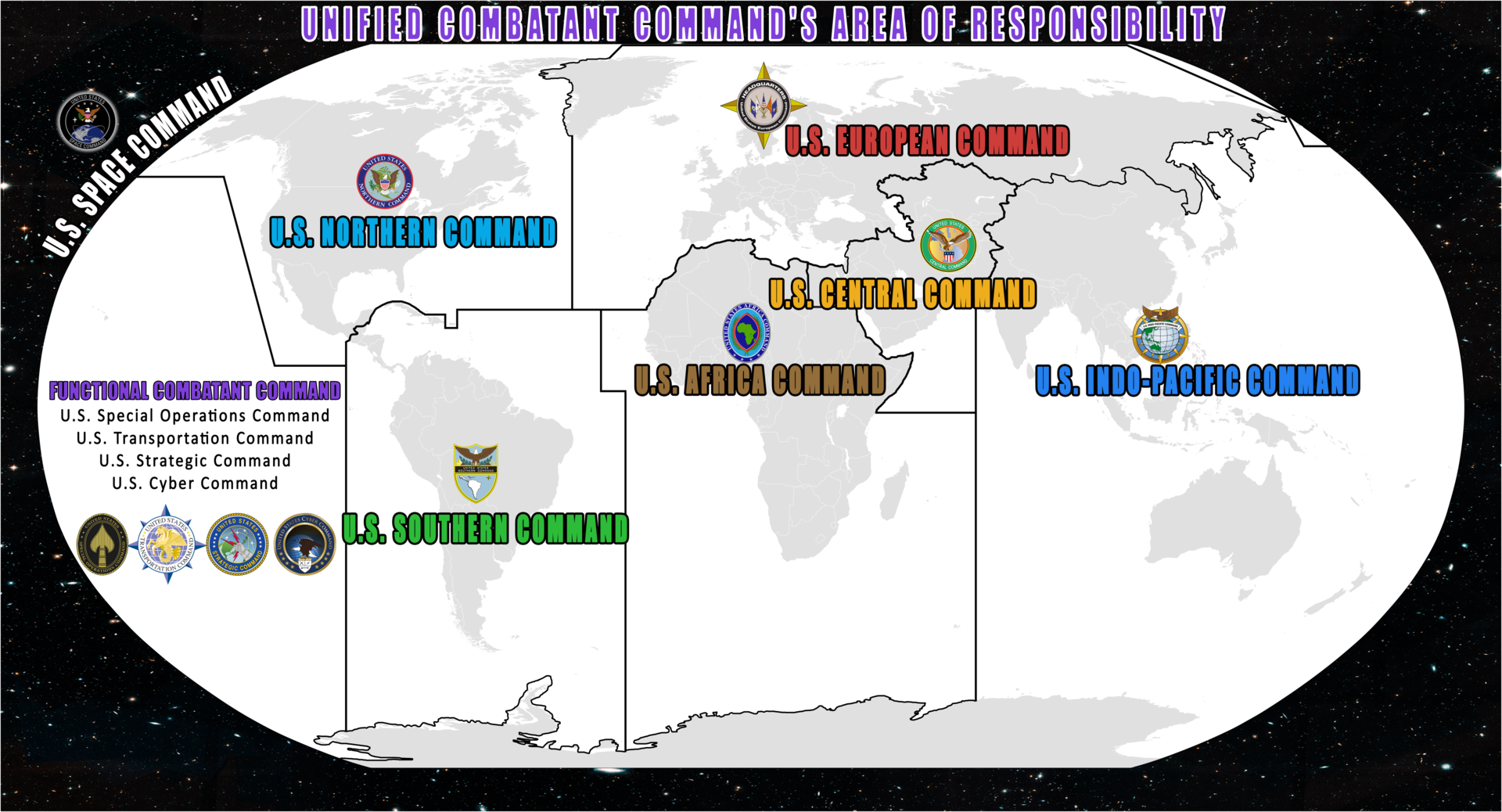Difference between revisions of "NORTHCOM"
m (Robin moved page United States Northern Command to NORTHCOM over redirect) |
|||
| Line 19: | Line 19: | ||
[[image:Unified Combatant Commands map.png]] | [[image:Unified Combatant Commands map.png]] | ||
{{SMWDocs}} | {{SMWDocs}} | ||
| + | |||
| + | |||
| + | |||
| + | |||
| + | |||
| + | ==Joint Task Force North== | ||
| + | |||
| + | "The U.S. Northern Command Area of Operations (AOR) includes air, land and sea approaches and encompasses the continental United States, Alaska, Canada, Mexico, and the surrounding water out to approximately 500 nautical miles. It also includes the Gulf of Mexico, Puerto Rico and the U.S. Virgin Islands. The defense of Hawaii and our territories and possessions in the Pacific remain the responsibility of U.S. Pacific Command. JTF-CS responds to CBRN incidents in the United States, its territories and possessions. This includes Alaska, Puerto Rico and the U.S. Virgin Islands. We would support of U.S. Pacific Command after incidents occur in Hawaii and U.S. territories and possessions in the Pacific. Currently JTF-CS does not have the mission of responding to CBRN and DSCA incidents in Canada or Mexico."[https://www.jtfcs.northcom.mil/About/] | ||
| + | |||
| + | "JTF-6 has completed over 5,000 missions in support of more than 430 federal, regional, state, and local law enforcement agencies and counterdrug task forces." [https://web.archive.org/web/20051128110256/http://wwwc.house.gov/reyes/news_detail.asp?id=708] | ||
| + | |||
| + | |||
| + | |||
| + | ==Involvement in Waco Siege== | ||
| + | |||
| + | "Citing federal documents obtained under the Freedom of Information Act, the newspaper reported that at one point, a top Army officer questioned the legality of military support for the Bureau of Alcohol, Tobacco and Firearms..... | ||
| + | The military previously has acknowledged that it provided assistance to federal law officers. In August, the General Accounting Office, an investigatory arm of Congress, reported that military personnel were called to the scene after the ATF "cited possible drug-related activity" at the Davidian compound..... | ||
| + | the military role began before Feb. 28, 1993, the day ATF agents tried to serve members of the Davidians with search and arrest warrants. A gunfight ensued; four agents and six Davidians died. The ATF had contacted Operation Alliance, an agency that coordinates law-enforcement requests for military help in fighting drugs.." | ||
| + | |||
| + | "In a Jan. 22, 1993 letter to Operation Alliance, ATF officials requested training by special-forces troops, instruction in driving Bradley Fighting Vehicles and the loan of seven Bradleys. | ||
| + | |||
| + | .... There have been allegations that members of the Army's Delta Force squad engaged in a shootout with the Davidians on the day of the April 19, 1993 fire in which sect leader David Koresh and about 80 followers died. However, military officials insist three Delta Force members were present that day as observers only. | ||
| + | Delta Force officers did meet with Attorney General Janet Reno to discuss proposals to flush the Davidians from the compound. | ||
| + | |||
| + | The newspaper cites a document in which an unidentified Delta Force officer reported that Reno was only offered limited advice - including the military's belief that inserting tear gas into the residence might cause mothers to panic and "run off and leave infants. | ||
| + | |||
| + | .... Maj. Mark Petree, commander of the Army's special forces, questioned the legality of the request. Maj. Phillip Lindley, his legal adviser, wrote in a Feb. 3, 1993 memo that the ATF request would make the military an active, illegal partner in a domestic police action. | ||
| + | After Joint Task Force-6 accused Lindley of trying to undermine the mission, he consulted his boss, Lt. Col. Douglas Andrews. Andrews told Lindley that the military could probably evaluate the ATF plan, but could not intervene to cancel it or revise it for the agency, the paper reported." | ||
| + | [https://www.washingtonexaminer.com/report-military-a-reluctant-participant-in-branch-davidian-siege] | ||
| + | |||
==References== | ==References== | ||
{{reflist}} | {{reflist}} | ||
{{stub}} | {{stub}} | ||
Revision as of 19:52, 18 August 2022
(Unified Combatant Command) | |
|---|---|
 Emblem of the United States Northern Command. | |
| Predecessor | Rapid Deployment Joint Task Force |
| Formation | 2002 |
| Headquarters | Peterson Air Force Base, Colorado Springs, Colorado, U.S. |
| Leader | Commander of United States Northern Command |
| Type | military |
| Subgroups | • U.S. Fifth Army/ARNORTH • First Air Force/AFNORTH • United States Fleet Forces Command • U.S. Marine Corps Forces Reserve/MARFORNORTH • Joint Force Headquarters National Capital Region • Joint Task Force-Civil Support • Joint Task Force North |
| Interests | North America |
| Other name | NORTHCOM |
The United States Northern Command (NORTHCOM) is the Unified Combatant Command charged with controlling North America.
Contents
"Area of Responsibility"
An event carried out
| Event | Location | Description |
|---|---|---|
| Vigilant Guard 17 | Atlanta Georgia (State) US | March 2017 military exercise held in Georgia, practicing "any sort of catastrophic event". Also coinciding with Atlanta bridge collapse. |
Joint Task Force North
"The U.S. Northern Command Area of Operations (AOR) includes air, land and sea approaches and encompasses the continental United States, Alaska, Canada, Mexico, and the surrounding water out to approximately 500 nautical miles. It also includes the Gulf of Mexico, Puerto Rico and the U.S. Virgin Islands. The defense of Hawaii and our territories and possessions in the Pacific remain the responsibility of U.S. Pacific Command. JTF-CS responds to CBRN incidents in the United States, its territories and possessions. This includes Alaska, Puerto Rico and the U.S. Virgin Islands. We would support of U.S. Pacific Command after incidents occur in Hawaii and U.S. territories and possessions in the Pacific. Currently JTF-CS does not have the mission of responding to CBRN and DSCA incidents in Canada or Mexico."[1]
"JTF-6 has completed over 5,000 missions in support of more than 430 federal, regional, state, and local law enforcement agencies and counterdrug task forces." [2]
Involvement in Waco Siege
"Citing federal documents obtained under the Freedom of Information Act, the newspaper reported that at one point, a top Army officer questioned the legality of military support for the Bureau of Alcohol, Tobacco and Firearms..... The military previously has acknowledged that it provided assistance to federal law officers. In August, the General Accounting Office, an investigatory arm of Congress, reported that military personnel were called to the scene after the ATF "cited possible drug-related activity" at the Davidian compound..... the military role began before Feb. 28, 1993, the day ATF agents tried to serve members of the Davidians with search and arrest warrants. A gunfight ensued; four agents and six Davidians died. The ATF had contacted Operation Alliance, an agency that coordinates law-enforcement requests for military help in fighting drugs.."
"In a Jan. 22, 1993 letter to Operation Alliance, ATF officials requested training by special-forces troops, instruction in driving Bradley Fighting Vehicles and the loan of seven Bradleys.
.... There have been allegations that members of the Army's Delta Force squad engaged in a shootout with the Davidians on the day of the April 19, 1993 fire in which sect leader David Koresh and about 80 followers died. However, military officials insist three Delta Force members were present that day as observers only. Delta Force officers did meet with Attorney General Janet Reno to discuss proposals to flush the Davidians from the compound.
The newspaper cites a document in which an unidentified Delta Force officer reported that Reno was only offered limited advice - including the military's belief that inserting tear gas into the residence might cause mothers to panic and "run off and leave infants.
.... Maj. Mark Petree, commander of the Army's special forces, questioned the legality of the request. Maj. Phillip Lindley, his legal adviser, wrote in a Feb. 3, 1993 memo that the ATF request would make the military an active, illegal partner in a domestic police action. After Joint Task Force-6 accused Lindley of trying to undermine the mission, he consulted his boss, Lt. Col. Douglas Andrews. Andrews told Lindley that the military could probably evaluate the ATF plan, but could not intervene to cancel it or revise it for the agency, the paper reported." [3]
